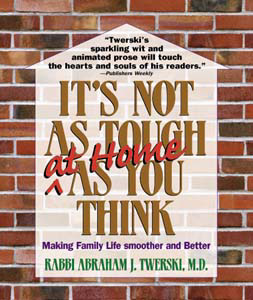 |
 |
Jewish World Review Oct. 21, 2003 / 25 Tishrei, 5764
http://www.jewishworldreview.com |
This is a topic to which I devoted almost the entire book Getting Up When You're Down. (Click HERE

You may purchase this
book by clicking on link in bio below
Turning the baby blues into tickled pink
I mention it here because too often remediable conditions are allowed to linger.
"Baby blues" may consist of just a few days when the mother's body undergoes some major changes following the pregnancy. But sometimes the blues persist. Nobody seems to be aware of what's happening, and various manipulations may be tried to help the new mother get over the blues.
What may have happened is that the many changes the mother's body undergoes after she delivers the baby may trigger an imbalance in the body's neurohormones. These are the chemicals that operate within the brain. Normally they are in delicate balance. If this balance is upset, the result may be severe depression (postpartum depression). Proper medical treatment is necessary to restore the delicate balance of the neurohormones. Delaying treatment allows unnecessary suffering to continue. The depressed mother cannot give her infant the proper attention. She may then feel guilty over this, which only aggravates the depression. She may even begin to think, "Maybe I didn't want this baby." This is a very painful feeling.
New mothers can use all the help they can get. It has been said that what a new mother needs is her mother. This is not always possible. But even if she does get adequate rest and help, this may not be enough. A chemical imbalance can cause her to feel depressed.
Early attention to postpartum depression is important. If the "baby blues" do not disappear after the first week, a doctor should be promptly consulted for evaluation. With proper treatment, the mother can have the joy she deserves and be tickled pink with her newborn infant. Hopefully she won't have to cope with our next issue.
